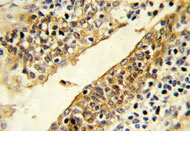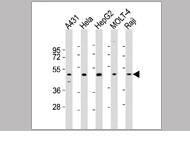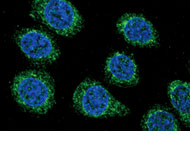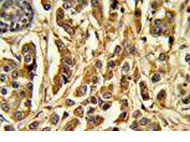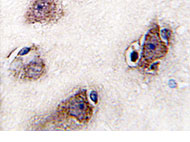Target of the Week - CYP Antibodies

|
Dear Metabolism Researcher, Abgent offers a portfolio of 100+ antibodies for the detection of the family of Cytochrome P450 enzymes. Applications include western blotting, immunohistochemistry, immunofluorescence, and flow cytometry. Cytochrome P450 enzymes are involved in the synthesis and metabolism of various molecules and chemicals within cells. Cytochrome P450 enzymes play essential roles in the synthesis of molecules such as steroid hormones, fats (cholesterol and other fatty acids), and acids used to digest fats (bile acids). Additional cytochrome P450 enzymes are critical in the metabolism of xenobiotics, including medications and toxins. To find the right CYP antibody for your research, please visit Abgent CYP Antibodies. |
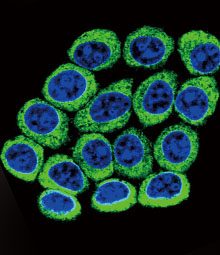
Cat# AF1995a Antibody to SIRT4
|
Abgent is highlighted in the Antibody Quality Review published by Nature.
 |
 |
 |














 Foundational characteristics of cancer include proliferation, angiogenesis, migration, evasion of apoptosis, and cellular immortality. Find key markers for these cellular processes and antibodies to detect them.
Foundational characteristics of cancer include proliferation, angiogenesis, migration, evasion of apoptosis, and cellular immortality. Find key markers for these cellular processes and antibodies to detect them. The SUMOplot™ Analysis Program predicts and scores sumoylation sites in your protein. SUMOylation is a post-translational modification involved in various cellular processes, such as nuclear-cytosolic transport, transcriptional regulation, apoptosis, protein stability, response to stress, and progression through the cell cycle.
The SUMOplot™ Analysis Program predicts and scores sumoylation sites in your protein. SUMOylation is a post-translational modification involved in various cellular processes, such as nuclear-cytosolic transport, transcriptional regulation, apoptosis, protein stability, response to stress, and progression through the cell cycle. The Autophagy Receptor Motif Plotter predicts and scores autophagy receptor binding sites in your protein. Identifying proteins connected to this pathway is critical to understanding the role of autophagy in physiological as well as pathological processes such as development, differentiation, neurodegenerative diseases, stress, infection, and cancer.
The Autophagy Receptor Motif Plotter predicts and scores autophagy receptor binding sites in your protein. Identifying proteins connected to this pathway is critical to understanding the role of autophagy in physiological as well as pathological processes such as development, differentiation, neurodegenerative diseases, stress, infection, and cancer.